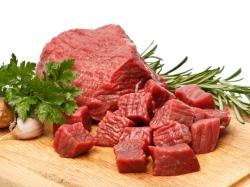Beef Science & Nutrition Around The Globe
November 27, 2013 | 3 min to read

This September, the beef checkoff's nutrition research team headed to Granada, Spain for the prestigious International Congress of Nutrition at which the International Meat Secretariat (IMS) hosted a symposium titled "Protein Requirements throughout the Lifecycle." An impressive line-up of internationally-renowned nutrition scientists highlighted the importance of high quality protein, as found in red meat. One such presentation was delivered by Nancy Rodriguez, Ph.D., R.D., FACSM, professor of nutritional sciences at the University of Connecticut, on behalf of the checkoff.
The importance and power of protein is gaining more traction in scientific academia; this was the industry's chance to share ground-breaking research with key influencers, opinion leaders and policy makers in the global nutrition world.
Rodriguez outlined research suggesting dietary protein requirements may well be higher than current recommendations suggest; functional outcomes becoming an increasingly important measure. Rodriguez also addressed the myth around protein and bone health, dismissing claims that protein increases net calcium losses.
"At least two meals a day, one of which is breakfast, each containing 25-30g of high-quality protein foods such as red meat, are needed to maximize the rebuilding of muscle protein. One 3- to 4-ounce cooked serving of beef contains 25-30 grams of high quality protein," says Rodriguez. "Over the last decade, the beef checkoff's research investment has played a pivotal role in improving understanding of protein's role in optimal health. Today we know that many individuals benefit from incorporating more high quality protein into their diet."
Also on Oct. 2-3, 2013, more than 60 nutrition researchers and thought leaders, including Becky Walth, South Dakota beef producer serving on the checkofffs nutrition and health subcommittee, convened in Washington, D.C., to review and discuss new research on protein and its role in public health during Protein Summit 2.0. The Protein Summit 2.0 agenda was designed to facilitate an interactive, scientific dialogue and explore the unique opportunities for proteinfs role in human health, and focus on how to help Americans optimize protein intake for improved health.
"This credible research stemming from our beef checkoff investment and published by the researchers, is making its way to consumers and that's exciting," says Walth. "People are looking at other meal options rather than just dinner. The consensus that beef can be part of meals where we typically donft find beef, spreading the protein consumption out throughout the day, is a great practical translation for our product."
Rodriguez, who serves on the Protein Summit 2.0 steering committee, says the Summit included detailed research panel presentations and robust discussion on how to advance the science and identify pathways to help people optimize protein intake for health.
"Experts covered everything from weight management, to lipid and glucose function, to healthy aging and building healthier protein-rich diets within calorie goals," says Rodriguez. "The Summit then focused on ways to work with healthcare practitioners to translate and apply the scientific research to consumer lifestyles."
The beef checkoff led the development of the Protein Summit 2.0, with financial support from the Dairy Research Institute, Global Dairy Platform, Egg Nutrition Center, Hillshire Brands and National Pork Board.
For more information about your beef checkoff investment, visit MyBeefCheckoff.com.
The Beef Checkoff Program was established as part of the 1985 Farm Bill. The checkoff assesses $1 per head on the sale of live domestic and imported cattle, in addition to a comparable assessment on imported beef and beef products. States retain up to 50 cents on the dollar and forward the other 50 cents per head to the Cattlemen's Beef Promotion and Research Board, which administers the national checkoff program, subject to USDA approval.
Source: The Beef Checkoff Program
